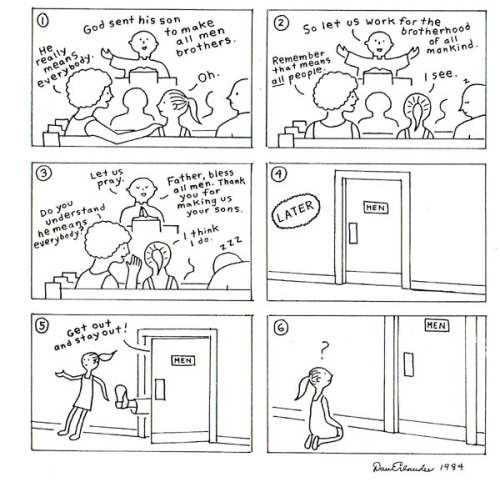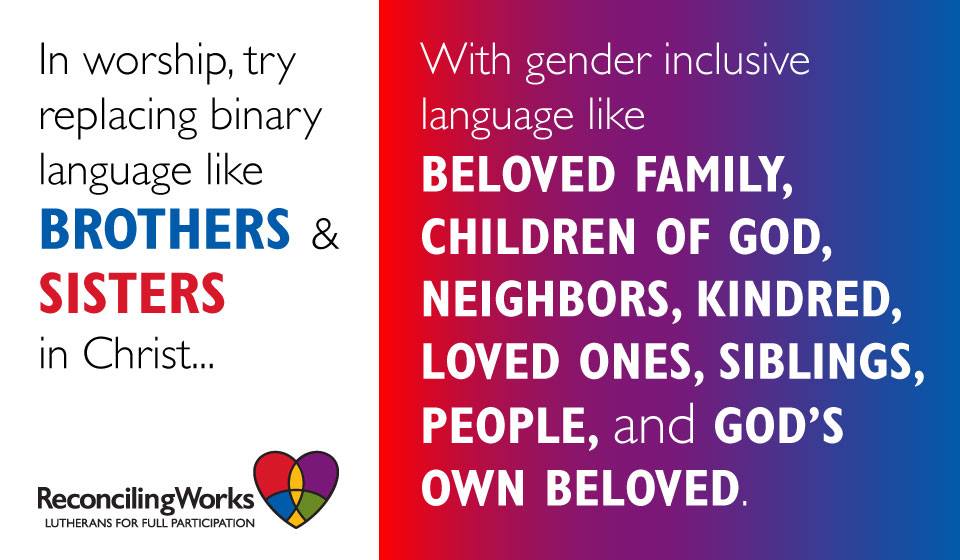How do we talk about the people of God?
Inclusive language is the intentional use of words and phrases that include all participants. Worship in Christian churches has often been patriarchal, using masculine terms to refer to everyone — for example, “mankind” vs “humankind” or “humanity.” Using patriarchal language — like “men” to refer to all people or “brotherhood” to mean love between all — is not only exclusive to women, but also ignores the experience of intersex, genderqueer, and transgender Christians.
Many churches seek to use alternative language which either balances gender references or avoids gender-specific terms altogether.
Inclusive language in worship is not only limited to issues of gender. Many faithful Christians do not find comfort in “traditional” expressions of faith that depict God as militant, or that focus on God’s total dominion over and oppression of all creation. (This language is sometimes called kyriarchal, meaning “built around domination, oppression, and submission.”) Other churches choose to change language that is insensitive to those with physical disabilities. There may also be racial implications where “dark” or “darkness” (vs “light”) was meant as negative, bad, or evil.
Changing “traditional” language is nothing new in the Christian church. Language continues to change over the decades, and often words that meant a great deal to our faithful ancestors are lost to us. For example, the famous Christmas carol “Hark the Herald Angels Sing” was originally written as “Hark How All the Welkin Rings”!
Dean McIntyre writes in his article “Making Hymns Inclusive“:
How is a person who is blind, deaf, without speech, or in a wheelchair to react to stanza six of “O For a Thousand Tongues to Sing” (no. 57): “Hear him, ye deaf, his praise, ye dumb, your loosened tongues employ; ye blind, behold your Savior come, and leap, ye lame, for joy”? When a worshiper does not hear the sermon, cannot sing the hymn, is unable to see the words of Scripture on the page, or remains in a wheelchair, what is the effect of these words? That worshiper may very well come to feel as if he or she is less of a Christian, less of a participant in the worship service, less of a person than those all around who can do these things.
So, why do it? The answer is to include, to welcome, to invite, to affirm, to love, rather than the opposite.

What does inclusive language for the people of God look like in worship?
Scripture: In the cultures in which the Bible was written, it was common to use “men” to refer to all people. Some translations choose to reflect the original language with traditional masculine language. Other translations bridge the gap between the original language and contemporary English by using balanced gender references or avoiding gender-specific language.
Examples: Paul’s letters addressed to “brothers” can be translated as “brothers and sisters” (for example, 1 Corinthians 1:10 in the New International Version, New Revised Standard Version, New Living Translation, Contemporary English Bible). The Message translates it as “friends.” Some Christians may additionally translate “brothers” as “beloved,” “children of God,” or other non-binary language.
Hymns: Many traditional hymns were written in a time in which patriarchal language was common. Many hymnals, worship directors, and congregations choose to change “traditional” masculine language into more inclusive, in order to celebrate the diversity of the people of God. Other churches prioritize more contemporary hymns and songs that do not use any binary or gender-exclusive language.
Examples:
“Good Christian Men Rejoice” becomes “Good Christian Friends Rejoice.”
“Rise up, O men of God!” becomes “Rise up, ye saints of God!” or “Rise up, O Church of God!”
“If thou but suffer God to guide thee” becomes “If you but trust in God to guide you.”
“Drive the dark of doubt away” in “Joyful Joyful We Adore Thee” becomes “drive the gloom of doubt away.”
“Pleased as man with men to dwell” in “Hark! the Herald Angels Sing” becomes “pleased with us in flesh to dwell” or “pleased as man with us to dwell.”
Liturgy, Prayers, and Preaching: Liturgy, prayers, and other pieces of worship are often formed in or informed by masculine language as universal language (as demonstrated in the above comic panel!).
Examples:
“Mankind” or “men” to refer to all people can be replaced by “humanity,” “humankind,” “people,” “all people,” “everyone,” or “people of God.”
“Brothers” can be expanded to “brothers and sisters,” or can expand beyond the gender binary with “beloved family,” “children of God,” “neighbors,” “kindred,” “loved ones,” “siblings,” “people,” “community,” “kin,” “God’s own beloved.”

Related Entries
How do we talk about God’s gender?
How do we talk about God in worship?
Further Reading
Dean McIntyre, Discipleship Ministries of the United Methodist Church, “Making Hymns Inclusive“
Rev. Miller Hoffman and Rev. Aaron Miller, “Metropolitan Community Churches Inclusive Language Guidelines” (2018)
Reformed Church in America Commission on Worship, “The Theology and Place of Music in Worship” (1996)
Michael Rathke, CBE International, “Editing and Choosing Hymns for Inclusive Language” (1991)
Dawn Boelkins, Emily Brink, Michael Smith, Howard Slenk, James Vanden Bosch, Mervin Van Doornik, Reformed Worship, “Is Nothing Sacred? Changing the Language of Our Hymns” (1987)
